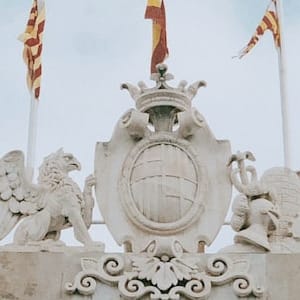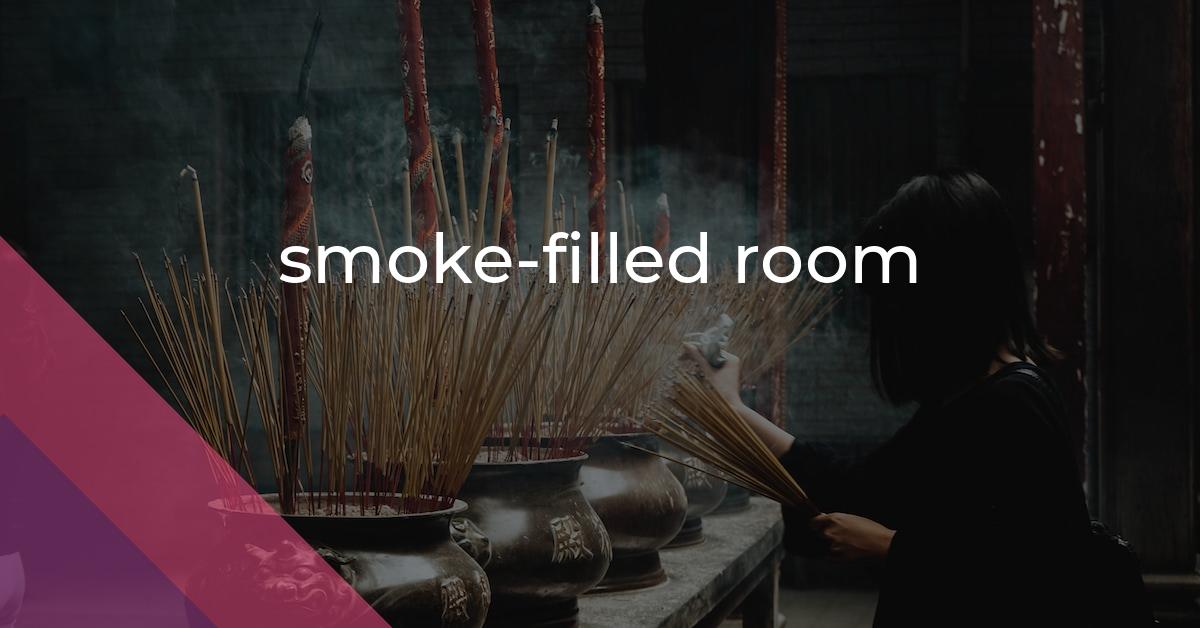smoke-filled room: Idiom Meaning and Origin
What does ‘smoke-filled room’ mean?
The idiom "smoke-filled room" refers to a secretive place where influential people make important decisions. It suggests a closed-door setting where discussions take place, often with a sense of backroom politics and hidden agendas.

Idiom Explorer
The idiom "the cat's out of the bag" means that a secret or hidden information has been revealed or made known to everyone, often causing surprise or a negative outcome.
The idiom "tell tales" means to reveal or disclose secret information or to give away confidential or incriminating details about someone or something.
An idiom meaning to leave or depart, often used to describe ending a project or leaving a place quickly.
"Smoking gun" is an idiom that refers to a piece of evidence or proof that clearly shows someone's guilt or wrongdoing, leaving no doubt about their involvement in a particular event or situation.
The idiom *smoke signal* refers to a form of communication used by Native Americans, where smoke is used to send a message. It is often used metaphorically to describe a method of conveying information indirectly or subtly.
The idiomatic expression "smoke like a chimney" means to smoke a lot or excessively, often referring to the act of smoking cigarettes or pipes. It implies a person who smokes constantly or has a heavy smoking habit.
Uncovering Hidden Intrigue
The idiom "smoke-filled room" is deeply rooted in American political history and is commonly used to describe a secretive and influential gathering where decisions are made without transparency or public scrutiny. This idiom is related to several other idioms that also convey the concept of secrecy and hidden decision-making.
One such idiom is "blue chamber," which is often used synonymously with "smoke-filled room." Both idioms refer to a situation where important decisions are made behind closed doors and away from public view.
Another related idiom is "behind closed doors," which captures the essence of the clandestine nature of smoke-filled rooms. This phrase emphasizes the idea that important discussions and decisions are happening in a setting that is inaccessible to the general public.
"smoke out" is another idiom that connects to the concept of a smoke-filled room. This phrase is often used to describe the action of uncovering or revealing hidden information or intentions. It is as if the smoke is being cleared away to expose the truth.
While the idiom "in a hen's hiney" may not be as directly related to a smoke-filled room, it similarly conveys the idea of secrecy and hiddenness. The phrase implies that information or objects are hidden in such a way that they are difficult or impossible to find, much like the inner recesses of a hen.
Lastly, the idiom "closed book" can be applied to the concept of a smoke-filled room. It suggests that the actions and decisions made within these rooms are closed off from public knowledge and understanding. The true motivations and implications remain unknown and inaccessible.
These idioms reflect the enduring fascination with the secretive aspects of politics, the influence of backroom dealings, and the potential manipulation of democratic processes. They serve as a reminder of the ongoing need for transparency and accountability in various spheres of society.
In exploring the historical roots and wide-ranging usage of these idioms, one realizes the complex nature of political power and the ever-present possibility of insidious decision-making that may shape the trajectory of nations and institutions.
The usage of these idioms extends beyond politics. They can also be found in the context of business negotiations, where closed-door meetings between executives or lobbyists may result in agreements that impact industries or societies at large.
Furthermore, these idioms have seeped into popular culture and literature, exemplifying the allure of secrecy and intrigue. They often carry negative connotations, suggesting a lack of transparency, fairness, and democratic principles.
While the origin and early usage of these idioms were related to physical smoke-filled rooms, they have transcended their literal meanings to symbolize the hidden workings of power dynamics, where decisions are made out of public view.
These idioms encapsulate the ongoing fascination with the secretive aspects of decision-making, the influence of backroom dealings, and the potential manipulation of democratic processes. They serve as a reminder of the delicate balance between secrecy and openness, and how these two forces shape the direction of our society.
Example usage
Examples of how the idiom *smoke-filled room* can be used in a sentence:
- They made the decision in a smoke-filled room, away from public scrutiny.
- The politicians negotiated the deal behind closed doors in a smoke-filled room.
- The company's executives gathered in a smoke-filled room to discuss their future strategy.
More "Environment" idioms



